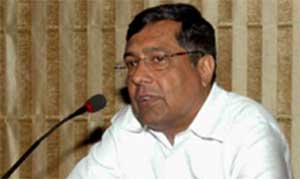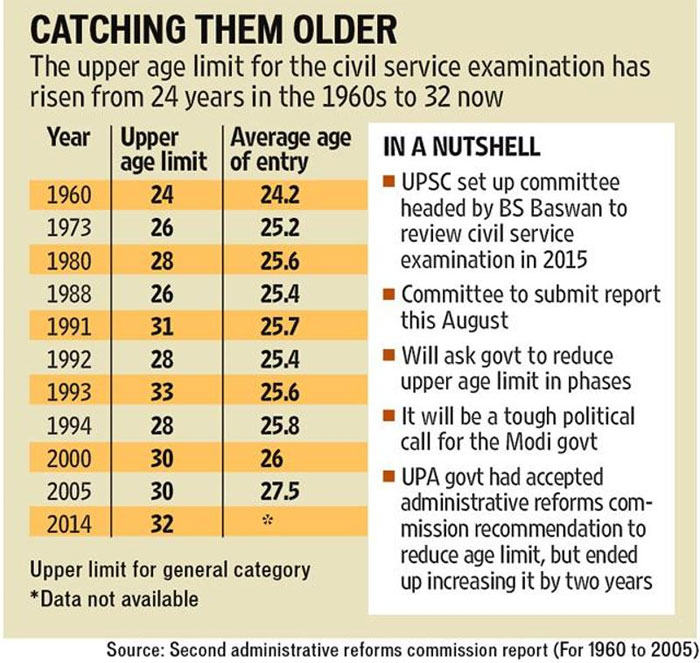(FREE) UPSC Current Affairs 2025 PDF
NEW! The Gist (MAY-2025) | E-BOOKS
(News) BS Baswan committee recommends reducing the upper age-limit for UPSC Exams
BS Baswan committee recommends reducing the upper age-limit for UPSC Exams
 A Union Public Service Commission-appointed committee is set to tell the
government to reduce the upper age-limit for appearing in the examination to get
into premier civil services such as the IAS and IPS.
A Union Public Service Commission-appointed committee is set to tell the
government to reduce the upper age-limit for appearing in the examination to get
into premier civil services such as the IAS and IPS.
The UPSC appointed the panel headed by former education secretary BS Baswan last August as part of an initiative by the Narendra Modi government to overhaul the civil services examination.
The government had promised to review the examination after a string of protests in 2015 against a civil service aptitude test introduced by the previous Manmohan Singh-led government in the preliminary exam.
“We feel that the entry age is on the higher side. At the same time, we realise that candidates should not be put to any unforeseen hardship. Therefore, we would prepare a road map which will give all candidates sufficient time to adapt to the new system,” Baswan said.
Over the decades, the upper age-limit for candidates from general categories has gone up from 24 years in the 1960s to 32 years for the 2014 exam.
The upper age is relaxed by five years for candidates from the scheduled caste and scheduled tribes while those from the other backward classes get a three-year relaxation. Disabled candidates get an additional 10-year cut.
In 2012 and 2013, the proportion of successful candidates well past their 30th birthday was in the range of 6 to 11%.
A 43-year-old “grandfather”, a disabled from the scheduled caste community who had applied for age relaxation on both counts, could be the face of the panel’s argument for lowering the age in its report. Sources said the panel was trying to locate the candidate to make its point.

Baswan refused comment, saying he would let the report do the talking.
A senior government official informed that a call on the recommendation would be taken once the panel submitted its report. He, however, said the panel — which has time till August to give its report —had sounded them out about its conclusion; that reducing the entry age for candidates had to be at the heart of any exam reforms.
“I can only say that the government is very clear in its mind that it will not spring a surprise on the candidates,” the official said, referring to the previous UPA government’s last-minute decisions to change exam’s format.
It was in this context that the Baswan panel had been told to not only recommend changes but also spell out a reasonable time frame for implementation of its recommendations.
Government officials and training academies tasked to prepare successful candidates for a career in civil services have been pushing for lowering of the entry age. A common argument is that the civil servants found it difficult to adapt and internalise the core values demanded of the civil services once they were past their thirties.
But it will not be an easy decision for the government.
There have been several attempts in the past to explore the possibility of reducing the upper age. Former prime ministers Atal Bihari Vajpayee and Manmohan Singh had supported the proposal but had to back out after loud protests from politicians, insisting that it put rural candidates at a disadvantage.
Courtesy: Hindustan Times

